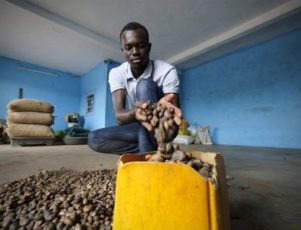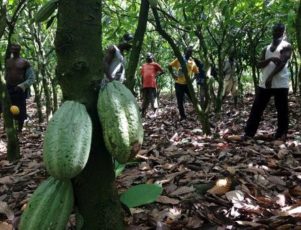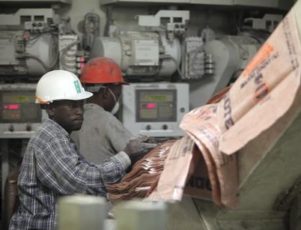ACCRA (Reuters) – Ghana could lose as much as 25 percent of its projected cocoa output this season as harsh winds and a lack of rain confound efforts to boost yields in the world’s second-largest producer, a government source said.
The Harmattan wind, which blows off the Sahara, sapping soil moisture and spoiling seeds, came early this season and has intensified in recent weeks, stunting pod growth more than usual and stifling government plans for expansion.
The West African country had hoped to produce 850,000-900,000 tonnes of cocoa in the 2015/16 crop year, up from the previous season’s 740,000 tonnes.
But a government source with knowledge of crop estimates said full-year production might not exceed 750,000 tonnes, and could fall as much as 25 percent short of initial estimates.
In addition to the impact of the weather, some cocoa farms have been destroyed by seasonal bushfire, the source said.
Regulator Cocobod, which had provided free early-maturing hybrid seedlings and fertilisers to boost the crop, said it was too early to know the effect of the weather on its output target and declined to give an estimate.
“Our technical men are just about to go to the field and until they come out with their findings, it will be too early to estimate the damage caused by the Harmattan,” Cocobod spokesman Noah Amenyah said.
In major western and eastern growing regions, farmers told Reuters that they are struggling to even meet last year’s quota.
“We started the year with high hopes because they (Cocobod) gave us all the inputs we needed, but we don’t have the same level of hope now,” 59-year-old farmer Stingo Arthur said, pointing at the withered pods clustered on the trees of his 20-acre farm.
“It is severe now because there is no rain.”
Arthur had expected to harvest more than thirty 64-kilogram (141-lb) bags this season, up from 20 bags last year after boosting his farm with 516 hybrid seedlings and fertiliser last June. So far, he has harvested only 18 bags.
Chief cocoa farmer for the Eastern region, Nana Obeng Akrofi, said he had revised down his original harvest target of 200 bags to “not more than 160” from his 45-acre cocoa cultivation at Bonsu, due to the devastating effects of the Harmattan.
Ghana produces 70 percent of its output in its main crop harvest between October and January. A July-September light crop is discounted to local processing companies.
The bad weather means farmers did not see the volume of beans that normally come at the tail end of the main crop.
Weather forecasters predict rain in mid February or early March but many farmers say that will be too late for light crop beans.
“My fear is that the light crop may be worse,” Akrofi said.
(Reporting by Kwasi Kpodo; Editing by Makini Brice, Edward McAllister and Jan Harvey)
Read more










